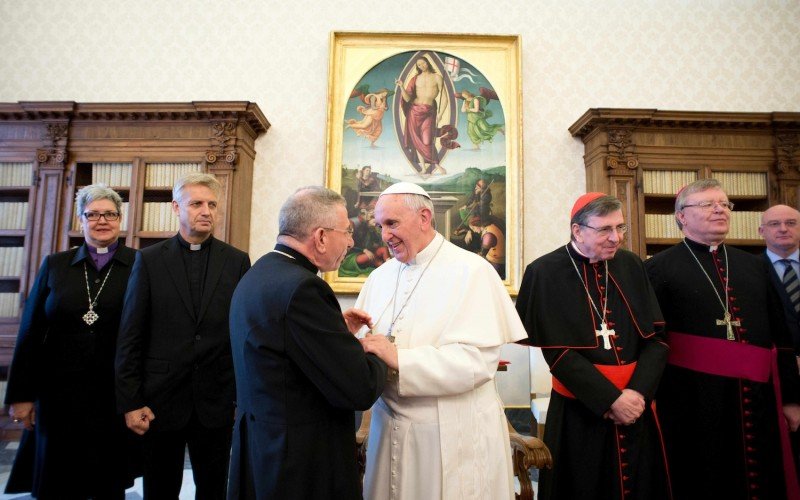Catholics asked to thank God for the ‘insights’ of the Reformation
David V Barrett-Catholic Herald - Tue, Apr 12th 2016

Pope Francis is greeted during a meeting with members of the Lutheran World Federation at the Vatican (Photo: CNS)
Joint prayer with Lutherans prepared in advance of the 500th anniversary of the Ninety-Five Theses
The Catholic and Lutheran Churches have issued a joint prayer thanking God for the “insights” received through the Reformation.
The service has been devised by the Pontifical Council for Promoting Christian Unity and the Lutheran World Federation in advance of the 500th anniversary of the Reformation next year.
The first jointly developed liturgical order is based on the report “From Conflict to Communion: Lutheran-Catholic Common Commemoration of the Reformation in 2017”.
The Common Prayer, which can be adapted to suit local customs and preferences, is led by two presiders, one Catholic and one Lutheran, with two readers, again one Catholic and one Lutheran. Other ecumenical readers and leaders of intercessory prayer can take part in the service.
One prayer reads: “Thanks be to you O God for the many guiding theological and spiritual insights that we have all received through the Reformation. Thanks be to you for the good transformations and reforms that were set in motion by the Reformation or by struggling with its challenges. Thanks be to you for the proclamation of the gospel that occurred during the Reformation and that since then has strengthened countless people to live lives of faith in Jesus Christ. Amen.”
The commemoration in 2017 brings joy and gratitude, the Common Prayer says, and must “also allow room for both Lutherans and Catholics to experience the pain over failures and trespasses, guilt and sin in the persons and events that are being remembered”.
The service has readings from the report From Conflict to Communion, including: “In the 16th century, Catholics and Lutherans frequently not only misunderstood but also exaggerated and caricatured their opponents in order to make them look ridiculous. They repeatedly violated the eighth commandment, which prohibits bearing false witness against one’s neighbour.”
One reading says: “Lutherans and Catholics often focused on what separated them from each other rather than looking for what united them. They accepted that the Gospel was mixed with the political and economic interests of those in power. Their failures resulted in the deaths of hundreds of thousands of people. Families were torn apart, people imprisoned and tortured, wars fought and religion and faith misused. Human beings suffered and the credibility of the Gospel was undermined with consequences that still impact us today. We deeply regret the evil things that Catholics and Lutherans have mutually done to each other.”
The service includes five commitments for Catholics and Lutherans together. “Catholics and Lutherans should always begin from the perspective of unity and not from the point of view of division in order to strengthen what is held in common even though the differences are more easily seen and experienced.” They “must let themselves continuously be transformed by the encounter with the other and by the mutual witness of faith” and should “commit themselves to seek visible unity, to elaborate together what this means in concrete steps, and to strive repeatedly toward this goal”. And they “should jointly rediscover the power of the gospel of Jesus Christ for our time” and “witness together to the mercy of God in proclamation and service to the world”.
Rorate Caeli, the traditionalist site, criticised the Common Prayer, saying it was the “first time that the drive for Catholic-Lutheran union and the glorification of the Reformation has taken a quasi-liturgical shape”.
share :
Related:
- Anglican Bishops back Church of England breakaway congregations
- Without the search for unity faith would be be abandoned
- Together for a just and fraternal society. Week of prayer for Unity.
- Measure of compromise
- In defence of the CofE’s House of Laity
- Dr Rowan Williams: joint prayer and contemplation are key to evangelising the world
- Russian church leader rejects criticism over state ties
- What hope for the faith school?


 Votes : 0
Votes : 0









